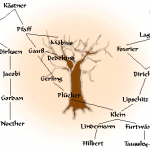FIZ0105 – Mechanics I
Vectors. Newton’s laws of motion. Frames of reference: Galileo transformations. Conservation of energy. Conservation of linear and angular momentum. Harmonic oscillator (Berkeley Physics Course, C. Kittel et al., Mechanics, Vol. I, McGraw Hill, 1965)
FIZ0106 – Mechanics II
Elementary dynamics of rigid bodies. Inverse square law of force. The speed of light. Special relativity: Lorentz transformatıon. Relativistic dynamics: momentum and energy. Problems in relativistic dynamics. Principle of equivalence (Berkeley Physics Course, C. Kittel et al., Mechanics, Vol. I, McGraw Hill, 1965).
FIZ3307 – Mathematical Physics II
Fourier series, Fourier transformations and applications, Laplace transformations and applications, Dirac delta function. Special functions: Legendre polinomials and applications, Bessel functions and applications, Hermite and Laguerre polinomials and applications, hypergeometric functions (Special Functions for Scientists and Engineers, W.W. Bell, Dover, 1968).
FIZ3305 – Quantum Physics
Limits of classical physics, black body radiation, photoelectric effect, wave-particle duality, uncertainty principle, postulates of quantum mechanics, solving one-dimensional potential problems with the Schrödinger equation, quantum structure of atoms. (Concepts of Modern Physics, Arthur Beiser, 6th ed, McGraw Hill, 2003; Quantum Physics, Berkeley Physics Course, Vol. 3, 1965). The following notes were prepared by Prof. Dr. S. ATAG.
FIZ0304 – Statistical Physics
Basic probability concepts, statistical interpretation of particle systems, heat interaction, microscopic theory and macroscopic measurement, Canonical distribution in classical approximation, general thermodynamic interaction, kinetic theory, Fermi-Dirac and Bose-Einstein statistics. (Statistical Physics, F. Reif, Berkeley Physics Course Vol. 5, 1965)
FIZ3318 – Condensed Matter Physics
Crystal structure of matter. Diffraction in crystals, reciprocal lattice. Binding in crystals. Lattice vibrations: phonons, thermal properties. Free electron Fermi gas (C. Kittel, Introduction to Solid State Physics, 7th ed., Wiley, 1996; Michahel P. Marder, Condensed Matter Physics, 2nd ed., Wiley, 2015). The following notes were prepared by Prof. Dr. S. ATAG.
FIZ0437 – History and Philosophy of Science
This course aims to introduce the history of science and examine the circumstances of objective (objective) information, to examine the relations between scientific thinking and the conditions of scientific thinking, to discuss the different scientific ways of thinking; in this way, the possibilities of alternate ways of thinking in the light of day (Colin A. Ronan, Science: its history and development among the world’s cultures, Cambridge Press, 1982).
FIZ0403 – Quantum Mechanics I
Basic principles of quantum mechanics and Experimental evidence of principles, Schrödinger equations, Heisenberg’s uncertainty principles, One Dimensional Problems, Angular momentum, Hydrogene atom, Algebric methods, Operator Formalism (Quantum Physics, S. Gasiorowicz, Wiley, 1974).
FIZ0404 – Quantum Mechanics II
Interaction of electrons with electromagnetic field. Spin, addition of angular momenta. Time independent perturbation theory. Relativistic correction to Hydrogen atom and spin-orbit interaction. Variational principle: Helium atom, Many electron atoms. Time dependent perturbation theory. Collision theory (Quantum Physics, S. Gasiorowicz, Wiley, 1974).
800700715030 – Classical Mechanics
Lagrange’s mechanics (D’Alambert’s principle, Lagrange’s equations, variational principle, nonholonomic systems. Conservation theorems and symmetry properties), Central force problem (two-body problem, Bertrand’s theorem, the Kepler problem, the Laplace-Runge-Lenz vector, scattering),the rigid-body motion (orthogonal transformations, the Euler angles, Cayley-Klein parameters, the Coriolis force, the Euler equations of motion, the top), small oscillations (The eigenvalue equations, normal coordinates, molecular vibrations), Lagrange’s equations (H. Goldstein, Classical Mechanics, Addison-Wesley, 1951).
800700715050 – Electrodynamics
Elements of vector analysis : Theorems of Stokes and Gauss. Maxwell’s equations, potentials and gauge – microscopic formulation. Basics of electrostatics; , Electrostatics of Media Boundary value problems in electrostatics and Green Function method Multipoles, electrostatics of macroscopic media, dielectrics (J. David Jackson, Classical Electodynamcis, Wiley, 3rd ed, 1998).
800700805060 – Advanced Electrodynamics
Magnetostatics, Faraday’s Law, Quasi-Static Fields , Maxwell Equations, Macroscopic Electromagnetism, Conservation Laws, Plane Electromagnetic Waves and Wave Propagation Waveguides, Resonant Cavities, and Optical Fibers (J. David Jackson, Classical Electodynamcis, Wiley, 3rd ed, 1998).
800700715070 – Quantum Mechanics
Mathematical preliminaries, postulates of quantum mechanics, the harmonic oscillator, the algebra of angular momentum, complete sets of commuting observables, addition of angular momenta, the quantum mechanical Kepler problem, Hydrogen and alkali atoms (J. J. Sakurai, Modern Quantum Mechanics, Addison Wesley, 2nd ed, 1994).
(Arno Bohm, Quantum Mechanics: Foundations and Applications,3rd ed, Springer-Verlag, 1993).
800700805080 – Advanced Quantum Mechanics
Approximation methods, spin, indistinguishable particles, the Helium atom, time evolution, some fundamental properties of quantum mechanics, scattering theory, elastic and inelastic scattering for symmetric interactions, radial wave functions, resonance phenomena, time reversal (J. J. Sakurai, Modern Quantum Mechanics, Addison Wesley, 2nd ed, 1994).
(Arno Bohm, Quantum Mechanics: Foundations and Applications,3rd ed, Springer-Verlag, 1993).
800700715011 – Mathematical Physics
Finite dimensional vector spaces; vectors and transformations, operator algebra, operator representations, spectral decomposition. Infinite dimensional vector spaces, Hilbert spaces, generalized functions, Fourier analysis. Complex Analysis; complex calculus, calculus of residues ( Mathematical Physics: A Modern Introduction to Its Foundations, S. Hassani, Springer-Verlag, 1st ed, 1999).
800700805021 – Advanced Mathematical Physics
Differential equations ; Separation of variables in spherical coordinates. Second order linear differential equations (SOLDE), complex analysis of SOLDEs, integral transforms and differential equations. Operators on Hilbert Spaces; operator theory, integral equations, Sturm-Liouville systems. Green’s Functions : Green’s function in one dimension, multidimensional Green’s functions and applications ( Mathematical Physics: A Modern Introduction to Its Foundations, S. Hassani, Springer-Verlag, 1st ed, 1999).
800700715091 – Statistical Mechanics
Thermodynamics, the laws of thermodynamics, applications of thermodynamics, thermodynamic description of Phase transition, Kinetic theory, kinetic theory of gases, the Maxwell-Boltzmann distribution, Boltzmann’s H-theorem, transport phenomena, classical statistical mechanics, elements of ensemble theory, the canonical ensemble, the grand canonical ensemble, quantum statistical mechanics, ideal Bose and Fermi systems, statistical mechanics of interacting systems, cluster expansions, the methods of pseudopotentials,the method of quantised fields, theory of phase transition the Ising model (Statistical Mechanics, Kerson Huang, 2nd ed, Wiley, 1987).
800700715351 – Many Particle Physics
Second quantization, Fock space, creation and annihilation operators, number operators, boson and fermion systems, study of electron gas, Wick’s theorem, Hartree-Fock approximation and its applications, analysis of exactly solvable systems (Many Particle Physics, G. D. Mahan, 1st ed, Plenum Press, 1981).
800700715000 – Research Methods
This course aims to provide a solid foundation in conducting quality research at graduate level in the field of science. The scientific research methods and their implications at different stages of the research process will be studied. The criteria of science will be discussed. The use of information technologies at all stages of research (on-line literature search, data processing, written communication and presentations) and other contemporary methods will also be considered.





